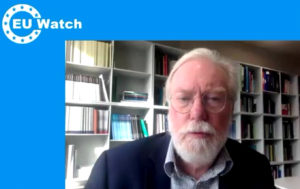Sir Paul Collier argues that Europe needs to restrict economic migration to win back the trust of citizens.
The renowned Oxford economist and book author (“Exodus”; “The Bottom Billion”) spoke at the EU Watch policy conference in Brussels in October 2021. Read here what he had to say.
We need a system, a policy which is sustainable. I’m going to argue that in European countries and in all democracies, the only sustainable common policy is one which is angled on citizens. That will then lead into the discussion of numbers of migrants. I’m going to argue that numbers matter fundamentally, and that has profound implications. Then, I’m going to say that any European policy has to be ethical and that ethical problems actually turns out to be really tough. It is not a load of happy talk unfortunately. Ethical policy is actually really quite uncomfortable. Then finally, I’m going to talk about any sustainable policy must be prudent in the sense of trying to minimise regrets that we end up having. That’s the agenda.
Let me start by going back to this point about any European policy has to start from the endorsement of a majority of citizens. In the democracy if most citizens are opposed to the policy, in the end it won’t happen. The political will realities will thankfully overwhelm the policies. And that’s what’s happened. There is a very painful reality: It is that there has been a profound loss of trust by ordinary citizens and their governments on the issue of migration. That’s the very uncomfortable reality, but it’s unfortunately quite manifestly true. There’s a very high level of anxiety amongst citizens. If we look at youth, it’s actually quite an incredible level of anxiety.

Photo: Shutterstock
Anxiety is fundamental because anxiety is forward-looking. It is about the views of the future. I contrast that with grievances, because grievances are always backward looking. They are about somebody blaming something or somebody. Grievances are very unhealthy to look at public policy, whereas reduced anxieties seem to be most important. It is manifestly the case that citizens, country after country, don’t trust their governments anymore on the migration issue.
Evidence
Let me turn a little to discussions of integration. I think there are two conclusions about integration. One of them being that there is quite a lot of variation across Europe in policies towards integration. Really an awful lot. Integration has proved harder than policymakers thought it would be. From the evidence I’ve seen, it’s hard to point to success.
There is this very good evidence from experimental social psychology. It builds on the evidence from nearly 30 years ago from how animal behaviour adapts. And the big concept at the time in animal behaviour was that it is useful to distinguish between actions that are harmful and actions that are beneficial, and between actions that are active actions and actions which are passive. If they have an active benefit or passive benefit, and active harm, i.e. actually inflicting harm, and passive harm. That’s now being extended through experimental social science to people. This is really quite recent research.
Cultures of violence
What it shows is that it’s exactly the same as animals. What is really kind of problematic is where you get a group of people who have a conscious active harm towards others, as being acceptable. They are the people who are slowest to adjust to social cues. Having said social cues, the actual context in which this research was inspired was indeed the very different rules around Western countries in whether it’s right to queue in a line or jostle and push to the front.
We have very different conventions, even within Europe. But cultures that are used to pushing to the front – a form of active harm – are the ones who are slowest to learn they are in a society where that just isn’t done. Where that is actually most worrying is cultures of violence. When you get people coming from a culture where violence against others is perfectly okay (as long as it’s not your own group, i.e. violence against others) they are the group that is the slowest to accommodate to a culture where violence against others isn’t okay, and that’s very scary, because it taps the slowest thing to adapt and is going to bring norms of violence.
We know one thing about violence, which is that it forms gangs. Once you get the gangs, it’s really very hard to get rid of them. I think that is a really serious concern. In some parts of Europe, we’ve got a gang culture established. Once it is there, it is very hard to get rid of. That produces huge backlash amongst local citizens, a huge loss of trust.
Why numbers matter
The other evidence is from relatively recent work by sociologists in Norway. They found that, in Norway there is a threshold of the ratio of immigrants to the local population in a place. It is pretty low, around seven percent. When the immigrant population starts to get above that, the population of non-immigrants starts to move elsewhere. That’s the explanation to why quantities matter, unfortunately.
In re-establishing trust, numbers are going to matter. That has very awkward implications because if numbers matter, there can’t be an unambiguous right to migrate. Citizens who won’t to agree to that unambiguous right to migrate because they’d lose control overnight.
Denmark is, by almost any measure you care to take, top of Europe in the sort of well-being measures. It is a very equal society. Even before Covid, it had a high degree social mobility and an unusually high degree of trusting government. And then along comes Covid, and it’s amazingly successful. It had both the lowest excess mortality in Europe and the lowest economic disruption. It has not privileged lives over economy, or economy over lives. It just achieved both. How did it do that? By a structure of mutuality and a very high degree of trust in leaders, so a very high degree of willing compliance in new purposes. Basically, Mette Frederiksen was able to say to people: We don’t know much about Covid but we do know it’s contagious, so protect your neighbour, don’t infect him. You are individually morally responsible for whether your neighbour catches it or not. So behave properly.
Successful examples
That was hugely successful. Because Denmark is such a successful place, everybody of any sense would want to go and live there. I recently discovered that my son and his girlfriend would rather live Denmark than in Britain, and I can’t blame them. But of course Denmark’s only five million people. And an awful lot of people would like to be better off living in Denmark, and there can’t be an unqualified right to go and live in Denmark. So, quantity matters. There needs to be some way to control access.
Another example is Botswana, a little country in Africa which 50 years ago was absolutely dirt poor. It was one of the poorest countries in Africa and in the world. Then they discovered diamonds. Most countries have discovered valuable resources, but Botswana really managed these diamonds prudently and became for many years the fastest growing country in the world – not just in Africa, in the world! So now, it’s about the highest per-capita income country in Africa and hugely successful. But there is about two million people and so, lots of people would like to go and live in Botswana.

Sir Paul Collier addressing the EU Watch policy conference on migration and integration in Brussels
I also worked on Nigeria, and Nigeria was even more fortunate than Botswana. It discovered something over a trillion dollars-worth of oil. Nigeria had had a democracy for quite a long time but it didn’t use that democracy to produce a good government. Nigerians would be much better off moving to Botswana but there are now 200 million Nigerians and only two million people in Botswana, so the Botswanans, very sensibly, have very strict rules in place on who can go live in Botswana. There is no right to migrate to Botswana. I could not go and work in Botswana. That seems to me right and proper.
Green Card lottery
If quantity matters, what does that mean? Here are a few suggestions. One (and it wasn’t me who thought about this in the first place) is the equivalent to the Green Card process. Citizens of a country agree on how much migration they want, and they say those are the number of places we’re willing to see people come into this year. If more people than that want to come in, then they can take part in the lottery. That’s the Green Card system in America. That’s an obvious way of reconciling a quantitative restriction with an open process. If you want to come, you can try but you will have to take part in the lottery.
Circular migration
The second example which we are also very keen on is circular migration. Circular migration’s a simply good idea because it maximises the number of opportunities for people in poor countries relative to the number of job slots available. It also has the huge advantage of people would come to Europe for a set period of years, lets say five years, earn some money, know that they were going back and therefore maintaining the relations with their home country and bringing their earnings and skills back to their country. We think circular migration provides actually by far the most benefit to poor countries themselves.
The final thing is there has to be legal routes through entry to work. Those people want to come to Europe, so there must be some legal route for them to be able to do so. People won’t use that legal route if there’s an irregular route which is easier. Hence, there has to be control of irregular routes, and that unfortunately means some sort of effective policy of return for those who are not deemed eligible for being in Europe.
What is ethical?
That’s the tough indications. Let me turn now to the issue of being ethical. There are two big things I will suggest. One: It is not ethical for us to run migration policy which is effectively plundering the skilled people that have been trained in poor countries. Let me give you an example of what I consider a complete ethical disgrace in my own country. This is how we run our National Health Service. Britain has some of the finest universities. We have amazingly 18 universities in the Top 100 in the world on research. We got some fabulous medical schools.
We should be, like Cuba, training a huge surplus of doctors which then go and work in the rest of the world. We do exactly the opposite because there’s been an evil alliance between the doctors trades union, which wants to keep the number of citizen doctors very limited, and the British Treasury, which has always decided that the cheapest way of running the National Health Service is not to train doctors, but instead to get them when they are already trained, which predominantly means Africa. I worked a lot on Africa, with African governments, including the Ghanaian government.
“Stealing doctors and nurses from poorer countries”
Ghana has a very good working democracy. It has to train more than two doctors for every doctor that it is able to keep, because more than half of them come to Britain. Why do more than half of them come to Britain? Because Britain trains less than half the doctors it needs each year for its National Health Service. Absurdly, we are basically stealing from Ghana.
Ghana does the training, more than two for everyone it needs, and we train less than one for every two we need. I think that’s ethically outrageous.
It gets worse with countries are much poorer than Ghana. When we turn to Sudan there are more Sudanese doctors in London then there are in the whole Sudan. And again, that’s shameful. Sudan’s biggest problem is that they are desperately short of people able to do basic things like doctors. The government, last year, created a programme called the year of return, trying to persuade the Ghanaian Diaspora to come home.
Seventy percent of the nurses trained in Malawi, for Europe, mainly for Britain. In fact so much so that the government of Malawi recently deliberately changed the qualifications so that Malawi nurses were trained wouldn’t anymore be eligible for Britain’s National Health Service. They lowered the training in order to just keep them in the country.
Do we need migrants?
The first rule is that, to the ethical, we mustn’t plunder the skilled people that very poor countries trained. The second ethical principle is that we must be honest with our own citizens. Here, I come to the issue of whether we, in some sense, need migrants. What is the relationship between the incomes of people in Europe and the number of migrants. This is being really thoroughly studied, and the honest answer i: There isn’t a relationship, it is exactly zero.
So, it’s very polarised. Some people want to say immigrants are lowering real wages, real incomes. Others want to say immigrants are raising living standards and incomes, and we need immigrants. The honest reality is, and we studied this very hard at, there is zero relationship. As far as we can see, there is no effect, either positive or negative.
There is an effect on composition, i.e. some evidence that at the lowest end of the labour market, immigration lowers wages. But that’s basically just the relative earnings within the population. It doesn’t affect the overall level of the population. Almost nobody wants to say that truth: We neither need immigrants nor are they a threat. The best approximation is: Over ten years, it’s about plus half a percent or minus half a percent of variation of real wages and incomes.
"The honest reality is: There is no effect, either positive or negative, of immigration, but nobody wants to say it", argues Sir Paul Collier at the EU Watch policy conference om #migration and #integration in Brussels. pic.twitter.com/EDMzgrYRww
— EU Watch (@EUWatchBrussels) November 5, 2021
I remember being urged by the British government at one stage who said please in your public statements will you say that Britain needs immigrants? And then someone said of course it doesn’t have to be true. That just struck me as being a very dangerous strategy because, if you lie to people, they certainly won’t trust you.
Prudence
Finally, we need to be prudent. Radical uncertainty is about the fact that we don’t know enough to have confident predictions about the future. Let me give you two areas where we really don’t have confidence on what’s about to happen in the future. One of them is what is the need for low skilled jobs. It seems quite likely that the demand for low skilled jobs in Europe will decline a lot, but maybe it won’t. We would be really very foolish to have a big increase in supply of low skilled workers. That’s one really obvious area.
What does that imply? Trying to avoid situations where we regret what we’ve done and that means staying on the side of prudence and caution so that if you have less migration then you turn out to nead, that’s pretty easy to correct. You can just start to accept more. If you make the mistake the other way, if you have more migration then you turn out wanted, well you’re stuck. You obviously can’t send people back.
So unfortunately, there is always a I need to be on the side of not creating situations that you would regret.






